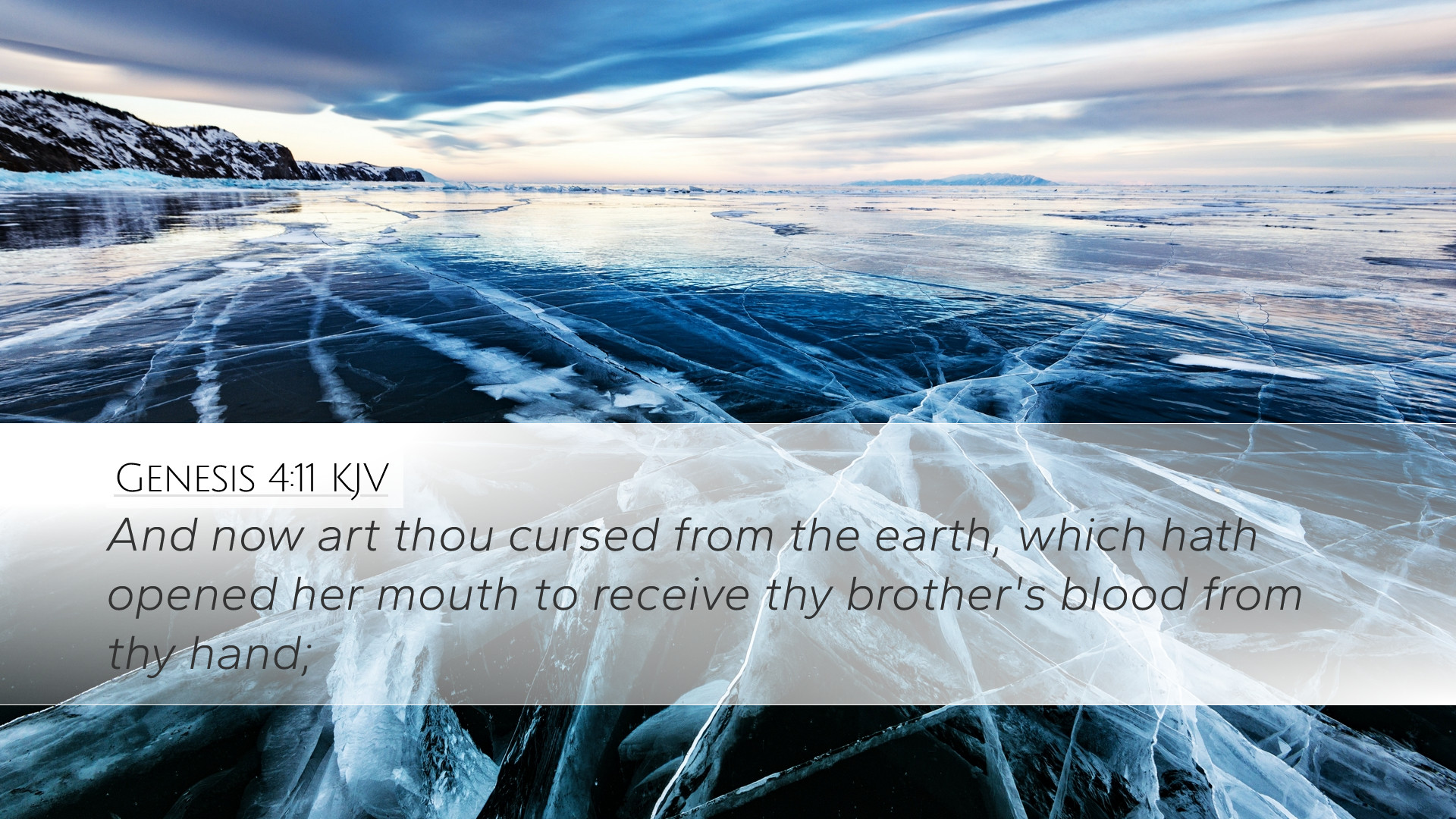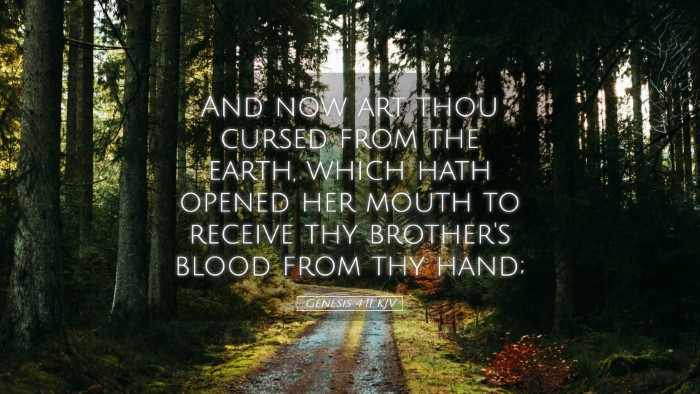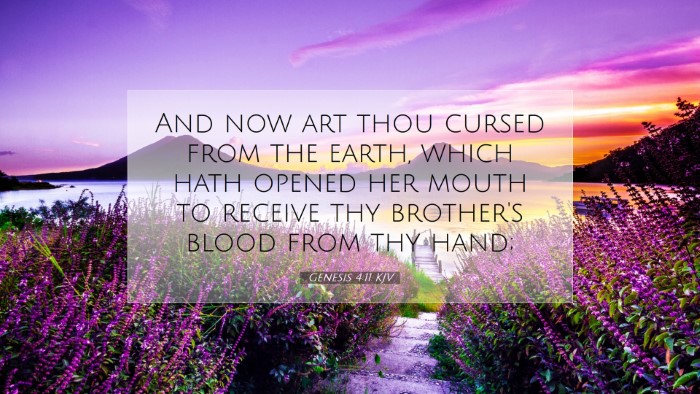Commentary on Genesis 4:11
Verse Text: "And now art thou cursed from the earth, which hath opened her mouth to receive thy brother's blood from thy hand."
Introduction
The verse Genesis 4:11 occurs in the narrative of Cain and Abel. It forms part of God's judgment upon Cain following his act of fratricide. This commentary seeks to explore the insights of notable biblical scholars such as Matthew Henry, Albert Barnes, and Adam Clarke, providing a comprehensive understanding of this crucial passage.
The Context of the Curse
The context surrounding this verse is pivotal. After Cain murdered his brother Abel out of jealousy and anger, he was confronted by God. The curse placed upon Cain signifies a severe consequence of sin, illustrating the deep impact that sin has on individual lives and the broader creation.
Matthew Henry's Insights
Matthew Henry highlights the gravity of Cain's sin and the serious nature of the consequences he faces. Cain’s curse represents a withdrawal of God’s favor and a separation from the earth's blessings:
- Cursed from the Earth: “The earth, which was once obedient to man’s commands, is now cursed due to Cain’s sin. This reflects the broader theological principle that sin affects not only the sinner but creation itself.”
- Receipt of Blood: “The earth now opens her mouth, indicating a responsive relationship between humanity and creation. Cain’s transgression brings a natural reaction - as bloodshed defiles and cries out for justice.”
Albert Barnes' Analysis
Albert Barnes provides a detailed exegesis on the textual implications of the curse:
- The Nature of the Curse: “The phrase ‘cursed from the earth’ emphasizes the loss of a productive and nurturing relationship with the soil. Cain’s livelihood, as a farmer, will now be a struggle.”
- Isolation and Alienation: “Cain is not merely cursed; his soul becomes alienated from the presence of God and man. This sets a pattern for the effects of sin, leading to a life lived in the shadow of despair.”
Adam Clarke's Observations
Adam Clarke adds theological depth to the discussion by examining the symbolic significance of Cain's punishment:
- The Role of Blood: “Clarke emphasizes that Abel’s innocent blood cries out for retribution. This is a precursor to later theological developments regarding blood and sacrifice, linking it to the greater narrative of redemption throughout Scripture.”
- Restorative Justice: “Clarke suggests that the curse can also be viewed through the lens of restorative justice - God’s disciplinary actions aim to lead Cain to repentance and a return to righteousness.”
Theological Implications
Genesis 4:11 serves as a critical point for understanding sin, punishment, and the multifaceted nature of God’s justice:
- *The Divine Judgment:* This verse underscores God's holiness and justice in dealing with sin. God’s pronouncement against Cain demonstrates that even the most grievous sins are met with a response from God.
- *The Relationship Between Sin and Creation:* As Cain's sin brings a curse upon the ground, it exemplifies the intertwined fate of humanity and the earth. Sin has cosmic consequences, reflecting the Old Testament prophetic vision where human sin brings about creation’s groaning (Romans 8:22).
- *A Call to Repentance:* Despite the severity of Cain's punishment, the narrative invites reflection on God's desire for repentance. Cain’s response reveals fear and despair, yet God’s inquiry opens a pathway for acknowledgment and turning from evil.
Practical Applications
This verse resonates with contemporary issues. Its themes foster a deeper understanding of personal responsibility and the social implications of our actions:
- *Awareness of Consequences:* Leaders and congregants alike are reminded that our actions carry significant consequences, echoing the relational dynamics established in Genesis.
- *Encouragement for the Struggling:* Cain's plight can encourage individuals grappling with feelings of guilt and despair. God’s grace can lead to restoration, and choices can still lead to new beginnings.
- *Ethical Reflection:* Cain's story invites ongoing reflection on decisions regarding anger, jealousy, and violence, encouraging communities to cultivate peace and reconciliation.
Conclusion
Genesis 4:11 encapsulates a pivotal moment in biblical history, showcasing the depths of human sin and the ensuing ramifications. The insights of Matthew Henry, Albert Barnes, and Adam Clarke unite to remind us of the sobering realities of sin, the justice of God, and the hope of redemption. Pastors, students, and theologians can draw upon these rich interpretations to craft a life of faith that acknowledges the seriousness of sin while eagerly pursuing restoration through grace.


